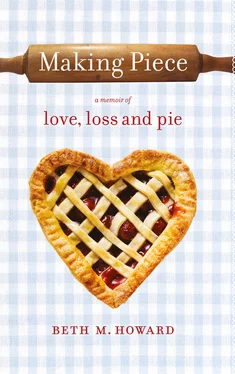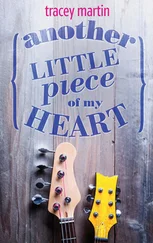Beth Howard - Making Piece
Здесь есть возможность читать онлайн «Beth Howard - Making Piece» — ознакомительный отрывок электронной книги совершенно бесплатно, а после прочтения отрывка купить полную версию. В некоторых случаях можно слушать аудио, скачать через торрент в формате fb2 и присутствует краткое содержание. Жанр: unrecognised, на английском языке. Описание произведения, (предисловие) а так же отзывы посетителей доступны на портале библиотеки ЛибКат.
- Название:Making Piece
- Автор:
- Жанр:
- Год:неизвестен
- ISBN:нет данных
- Рейтинг книги:3 / 5. Голосов: 1
-
Избранное:Добавить в избранное
- Отзывы:
-
Ваша оценка:
- 60
- 1
- 2
- 3
- 4
- 5
Making Piece: краткое содержание, описание и аннотация
Предлагаем к чтению аннотацию, описание, краткое содержание или предисловие (зависит от того, что написал сам автор книги «Making Piece»). Если вы не нашли необходимую информацию о книге — напишите в комментариях, мы постараемся отыскать её.
Making Piece — читать онлайн ознакомительный отрывок
Ниже представлен текст книги, разбитый по страницам. Система сохранения места последней прочитанной страницы, позволяет с удобством читать онлайн бесплатно книгу «Making Piece», без необходимости каждый раз заново искать на чём Вы остановились. Поставьте закладку, и сможете в любой момент перейти на страницу, на которой закончили чтение.
Интервал:
Закладка:
I had a few hours to contemplate my death, but did he know he was dying? The details that were parceled out over the next few days concluded no, he could not have known. It was instant. He felt a cramp in his neck, got out of bed, took a few steps and collapsed on the hardwood floor of a friend’s house.
I imagined him having one of those out-of-body experiences, floating above his body, looking down and seeing himself lying unconscious on the floor, and saying, “What the fuck just happened?” This is a man who wanted to live. He had just invested in a new MacBook Pro and an iPhone. He had a pile of new books including The Passion Test, What Color is Your Parachute and What Should I Do With My Life? And he had bookmarked his favorite new website, “Zen Habits,” which was all about doing less to accomplish more. After years of my incessant nagging, he was actually exploring ways to trade in his corporate life for something more balanced. Back in Germany, he had also just bought a new road bike, a sleek and fast-looking LaPierre, which he had shown me via Skype. He sent me emails from his weekend bike rides in France, Italy and even Slovenia. This was a man with a lot of life left to live and big plans for the future. He was only getting started.
The autopsy determined he died from a hemopericardium (blood flooding the heart sack until the heart cannot pump any longer) due to a ruptured aorta. Marcus had a heart condition from birth, a bicuspid aortic valve, which means he had only two flaps to allow oxygenated blood to flow out from the aorta instead of the normal three. Blood pumping through the aorta is under high pressure. Having only two flaps creates a bottleneck and puts added pressure on the aortic wall. The wall had a weakening that eventually tore. Unless it happens when you are already in a hospital, a ruptured aorta is always deadly. There is no grace period. The blood moves too fast. The heart suffocates. And bam! Just like that. The man you love is gone.
His German doctors had always maintained his heart condition would never be a problem. Had Marcus known how endangered his life was, he would have taken precautions. He was that kind of guy: disciplined in everything he did, especially when it came to his diet (only the highest quality, organic, wild-caught everything for him). He didn’t smoke, he exercised regularly, doing yoga, biking and running, and he loved being outside in the sun breathing fresh air. This was a guy who was so health-conscious, he flossed his teeth three times a day. Who does that? No, he was not supposed to die. Not like this. Not at forty-three. Not ever.
My brain spun with centrifugal force after hanging up with Mr. Chapelle. I looked around the living room of my miner’s cabin in a wild panic. My body shook with convulsions. My eyes widened with disbelief. My breathing turned to hyperventilating. I paced back and forth between the desk and the daybed. I had no idea what to do. Did I really just get a phone call telling me that Marcus was deceased? Deceased. I hate that word. What a miserable word. If only I could have taken that word and shoved it through the phone line, stuffed it back into the mouth of the man who uttered it, crammed it all the way down his throat to extinguish it so he could never say it. If he couldn’t say it, then it couldn’t be true.
My first call was to our divorce mediator in Portland. “He’s in a meeting,” his secretary said.
“It’s urgent,” I told her. She must have heard the panic in my voice—high-pitched, sharp and forceful. She put me through.
“Marcus won’t be coming in for his one-o’clock appointment. He died,” I blurted out. “He’s dead. He had a ruptured aorta.” And then my composure crumbled. “I don’t know what to do! I don’t know what to do! I don’t know what to do! I don’t know what to do!” I kept repeating myself, practically screaming in hysterics, as I entered into full-blown panic. To say it out loud to someone else, to acknowledge that which I desperately did not want to be true, made it just a little more real. Was it really true?
I could detect Michael’s shock in spite of his attempt to calm me. He was a Catholic-turned-Zen Buddhist, which he had told us when we interviewed and subsequently hired him to help negotiate our separation. Marcus was in Portland and thus met with him in person several times. I was only connected by conference calls and had never seen him, but based on his gentle voice, relaxed manner of speech and his respect for Marcus’s and my determination to remain amicable, he seemed nice—for a former litigation lawyer. He had changed his career to mediation because it seemed, well, less litigious. “Take a breath,” he said. “Settle down. You’re going to be okay. Here’s what you do.”
He outlined the next steps for me. Someone had to instruct me, because I couldn’t think straight. I couldn’t think past the image of Marcus and his lifeless body lying in a morgue thousands of miles away. No! I could not, would not, picture that. My mind was still insisting he was alive. He had to be alive. This was all a mistake. This wasn’t really happening.
“Book your flight to Portland,” Michael said, snapping me back to the present. “Call his parents in Germany. And above all, take care of yourself. You need to make sure you are okay. Do you have someone there who can be with you?” I didn’t. Betty, my landlord, was in El Paso for a few days. I had only my dogs and I was already scaring them. Daisy was hiding under the bed and Jack kept trying to lick my face, something he was prone to do when he was insecure.
I wanted to fly to Portland that evening. There was a flight available, and even with the five-hour drive to the El Paso airport, I could have made it. But when I discussed it with Mr. Chapelle, he said there was no reason to rush. It wasn’t like I needed to get there in case Marcus might take his final breath. He was already gone.
I spent the entire night awake; first tossing and turning in my bed until finally, so disturbed, so much wanting to crawl out of my skin to escape the searing pain, I moved into the living room and lay on the concrete floor in front of the fan. My forehead, pressed into the painted cement, rolled back and forth, practically wearing a groove into the hard floor as I wailed and wailed and wailed. I never heard such loud, guttural cries emitted from so deep within my core, never knew noises such as these were possible. I sounded like a dying animal, moaning like a cow hit by a car and left for dead on the road, wishing for someone to shoot it and put it out of its misery.
And I did feel like I was dying. I wanted to die. My moaning, my wailing, my cries could have been heard as far away as El Paso. But no matter how much, how long and how hard I cried, I couldn’t get the pain out. This new form of agony—sizzling, burning, tearing at my heart with razor blades—was an alien being that took over my body, infiltrating every cell. I couldn’t hold still. I couldn’t cry hard enough. I couldn’t scream loud enough. I couldn’t get the emotional torture to stop.
Psychologists call it complicated grief. It was almost a relief, as much as I could fathom any inkling of relief, to learn a few months later that what I was experiencing had a name, a clinical term. I had a condition. I could be placed in a category, given a label. I could wear a sign around my neck that read “Caution: This woman is suffering from complicated grief.”
Complicated grief is when someone you are close to dies and leaves you with unresolved issues, unanswered questions, unfinished business. And guilt. Lots and lots of guilt. And pain. Bottomless depths of searing pain. Complicated grief is when you ask your husband for a divorce you don’t really want, and he dies seven hours before signing the papers.
Читать дальшеИнтервал:
Закладка:
Похожие книги на «Making Piece»
Представляем Вашему вниманию похожие книги на «Making Piece» списком для выбора. Мы отобрали схожую по названию и смыслу литературу в надежде предоставить читателям больше вариантов отыскать новые, интересные, ещё непрочитанные произведения.
Обсуждение, отзывы о книге «Making Piece» и просто собственные мнения читателей. Оставьте ваши комментарии, напишите, что Вы думаете о произведении, его смысле или главных героях. Укажите что конкретно понравилось, а что нет, и почему Вы так считаете.












